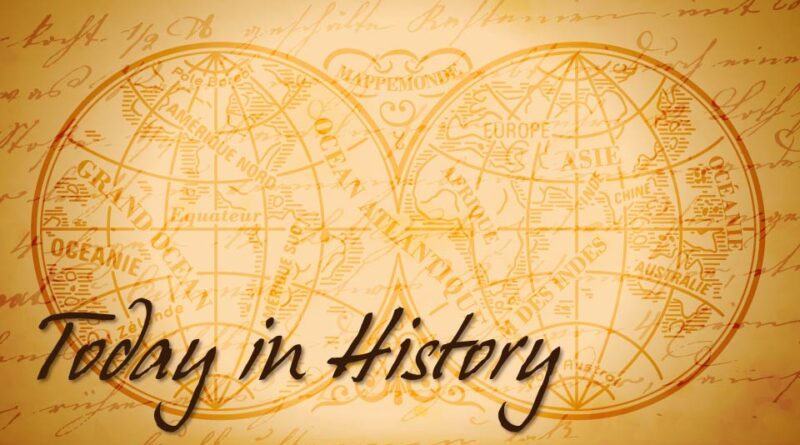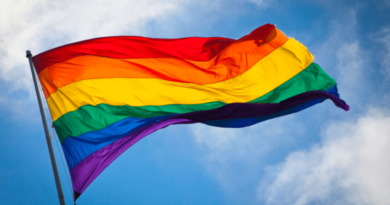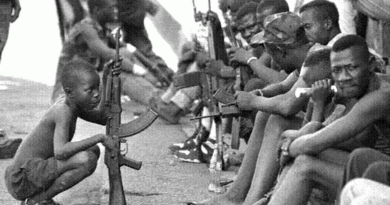On This Day: August 4 – Global & African History
On This Day, August 4, a date that might seem like any other, but beneath the surface lies a tapestry of stories that have shaped the world, across empires, ideologies, continents, and revolutions.
On this very day, mighty powers went to war, revolutions were sparked, and bold voices echoed in defiance of oppression. From the thunderous declaration of Britain entering World War, I… to the quiet but determined rise of Thomas Sankara, a young revolutionary who would rename a nation and redefine African leadership.
August 4 is more than a date. It’s a mirror reflecting the complexities of our global past—colonial legacies, resistance, innovation, and hope. It’s a day that reminds us how history lives not just in textbooks, but in names, places, and the choices of courageous people.
So, whether you’re a history lover, a student of Africa’s independence, or just someone curious about the past that shaped our present, you’re in the right place.
Let’s explore what happened on this day, and why it still matters.
Global Milestones
- August 4th, 1704, Britain Captures Gibraltar: During the War of the Spanish Succession, Anglo-Dutch forces seized Gibraltar from Spain on August 4, establishing British control over a key strategic gateway between the Atlantic and the Mediterranean.
- August 4th, 1790, U.S. Coast Guard Founded: On this date, Congress authorized ten revenue cutters to enforce trade laws—what became the United States Coast Guard. Celebrated annually as U.S. Coast Guard Day.
- August 4th, 1892, The Borden Murders: In Fall River, Massachusetts, Andrew and Abby Borden were brutally axed to death, sparking the infamous Lizzie Borden murder trial.
- August 4th, 1914, Britain Declares War on Germany: Germany invaded Belgium under the Schlieffen Plan; Britain declared war on Germany after issuing an ultimatum, marking its entry into World War I.
- August 4th, 1916, Liberia Joins World War I: The Republic of Liberia declared war on Germany on August 4, aligning with Allied powers and symbolizing its growing international presence.
- August 4th, 1936, Jesse Owens Wins Olympic Gold: At the Berlin Olympics, Jesse Owens captured the gold in the 100-meter dash, defying Nazi racial propaganda.
- August 4th, 1944, Anne Frank Arrested: The Gestapo discovered Anne Frank, her family, and others hiding in Amsterdam, leading to their deportation; Anne’s diary later became a timeless testament.
- August 4th, 1964: Civil Rights Tragedy in Mississippi: The bodies of three civil rights workers—Schwerner, Goodman, and Chaney—were found buried in Mississippi, setting off national outrage and fueling civil rights legislation.
- August 4th, 1977, U.S. Department of Energy Created: President Jimmy Carter signed legislation creating the U.S. Department of Energy on August 4, strengthening federal oversight of energy policy.
- August 4th, 1987, Fairness Doctrine Abolished: The FCC voted unanimously to eliminate the Fairness Doctrine, removing the obligation for broadcasters to provide balanced views on controversial issues.
- August 4th, 2007, NASA Launches Phoenix to Mars: NASA’s Phoenix spacecraft lifted off to study Martian arctic ice and hunt for signs of water.
- August 4th, 2020, Beirut Explosion Devastates Lebanon: Nearly 3,000 tons of improperly stored ammonium nitrate exploded at Beirut’s port, killing over 200, injuring thousands, and causing massive destruction. It was one of history’s largest non-nuclear blasts.
African Events on August 4
- 1983 – Coup in Upper Volta (now Burkina Faso): On August 4, a coup led by Thomas Sankara and Blaise Compaoré ousted President Jean‑Baptiste Ouédraogo. Sankara assumed leadership, eventually renaming the nation Burkina Faso in 1984.
- 1984 – Upper Volta Renamed Burkina Faso: Exactly one year after the coup, Sankara formally renamed Upper Volta to Burkina Faso—”Land of Incorruptible People”—symbolizing a post‑colonial identity.
- 1960 – West Africa’s Independence Tide: While not on August 4 directly, the days surrounding it mark multiple African nations gaining independence:
- August 3, 1960: Niger declares independence.
- August 5, 1960: Upper Volta gains independence, later renamed.
These rapid decolonization movements highlight August 4’s proximity to Africa’s liberation period.
Why These Events Still Matter
Britain’s World War I entry (1914) triggered a conflict reshaping global geopolitics.
Liberia’s wartime declaration (1916) showed Africa’s early role in global alliances.
Anne Frank’s arrest (1944) humanized the Holocaust and highlighted the fight against genocidal regimes.
Burkina Faso’s revolution (1983) and renaming (1984) reflect the legacy of post‑colonial African leadership and identity.
1960’s independence wave marked the dismantling of colonial empires across Africa.
Read Also: Nigeria’s Silent Weight Loss Crisis: The High Cost of Chasing Slimness
Africa’s Road to Independence: Revolution, Identity, and Leadership
The Wave of Independence – August 1960
The early 1960s marked a tidal wave of decolonization in Africa. In a single month—August 1960—a remarkable 14 African nations declared independence, primarily from France. This included:
- Niger on August 3
- Burkina Faso (then Upper Volta) on August 5
- Côte d’Ivoire on August 7
- Chad on August 11
- Central African Republic on August 13
- Congo-Brazzaville on August 15
- Gabon on August 16
- Senegal and Mali, earlier in June and September
These declarations reshaped the African continent. For many, independence came peacefully through negotiation; for others, it was the result of long resistance movements.
Burkina Faso and Sankara – August 4 as a Symbol
One of the most symbolic African events tied to August 4 is the 1983 coup d’état in Upper Volta led by Captain Thomas Sankara. Sankara, a charismatic Marxist and Pan-Africanist, took power on August 4, 1983, with a vision of self-reliance, anti-imperialism, and equality. Exactly one year later, on August 4, 1984, he renamed the country from the colonial name Upper Volta to Burkina Faso, meaning: “Land of Upright People” (from the Mooré and Dioula languages). This wasn’t just a name change. It was a break with colonial identity, and a declaration of a new national philosophy—centered on dignity, anti-corruption, and grassroots development.
Sankara’s policies included:
- Land redistribution to peasants
- Women’s rights reforms (banning forced marriages and promoting education)
- Reducing salaries of high officials (including his own)
- Rejecting foreign aid with strings attached
He was assassinated in 1987, but today he remains an enduring symbol of pan-African pride and revolutionary leadership.
Post-Colonial Leadership Themes
Across Africa, post-colonial leadership has followed several key themes:
- Nation-Building – Creating cohesive identities out of colonial borders.
- Economic Liberation – Reducing dependency on former colonial powers.
- Pan-Africanism – Leaders like Sankara, Nkrumah (Ghana), and Nyerere (Tanzania) dreamed of continental unity.
- Struggles for Democracy – Many post-colonial states faced authoritarianism, coups, and civil unrest.
Summary Table
Year Event Description Region
1704 Gibraltar captured by Britain Europe
1790 U.S. Coast Guard founded North America
1914 Britain declares war on Germany Europe
1916 Liberia joins World War I Africa
1936 Jesse Owens wins Olympic gold Global
1944 Anne Frank and family arrested Europe
1964 Civil rights workers found dead North America
1977 U.S. Department of Energy created North America
1983 Sankara’s coup in Upper Volta Africa
1984 Upper Volta renamed Burkina Faso Africa
2007 Phoenix launched to Mars Global
2020 Beirut explosion Middle East
Final Thoughts
August 4 isn’t just a date of coups and declarations—it’s a symbol of transformation. From Upper Volta’s rebirth as Burkina Faso to the continent-wide momentum of 1960, Africa’s modern history is full of leaders and people seeking dignity, freedom, and justice on their own terms.
Conclusion
August 4 stands out as a date woven into the fabric of history—spanning early modern strategy, colonial liberation, human tragedy, scientific breakthroughs, and political transformation. Africa figures prominently, especially in the rise of new nations and revolutionary leadership. These events continue to shape contemporary societies and remind us of the ongoing global quest for justice, freedom, and progress.
Content Credit | Olaoluwa Ayomide
Image credit | google.com




